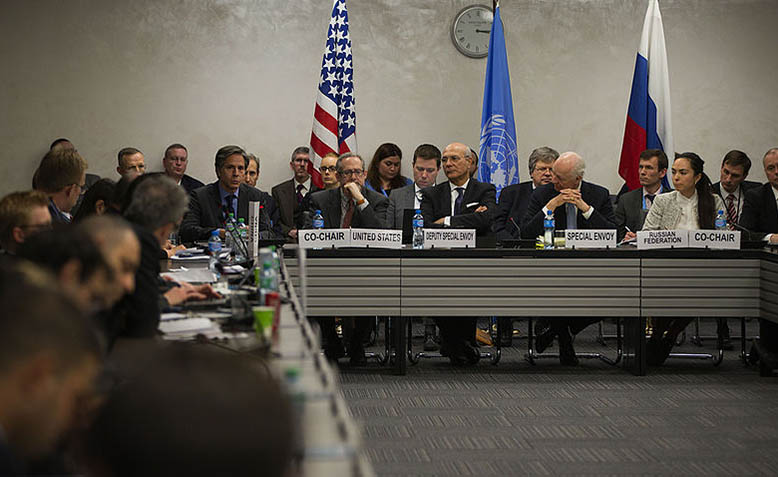 ISSG Ceasefire Task Force meeting earlier this year. Photo: Eric Bridiers
ISSG Ceasefire Task Force meeting earlier this year. Photo: Eric Bridiers
The ceasefire Syria is only temporary, and will not lead to lasting peace, argues Lindsey German
The temporary ceasefire due to take effect in Syria today can only be welcomed by those who have suffered so much and continue to suffer in this war which to date has taken 300,000 lives and left millions displaced both internally and as refugees. It is supposed to allow a brief respite where food and aid can be delivered to besieged areas, especially Aleppo.
But few can hope that this will lead to a more lasting peace. The ceasefire itself is only designed for a few days. And the planned outcome from it is not an extension of peace but a US and Russian joint military operation which will target ISIS and Jabhat Fatah al-Sham, formerly known as Jabhat al-Nusra, and connected to al-Qaeda.
While the Russians and Americans agree that this organisation has not changed, despite claims to the contrary, the deal threatens to drive a wedge between different opposition groups, who have worked very closely with al-Sham in Aleppo, and it was the latter group which temporarily broke the siege there a few weeks ago. Most opposition groups are accepting it, but it seems reluctantly and with the expectation that it will not succeed.
What the deal represents is significant, however. Joint military deals between the two major outside powers intervening in Syria represent a recognition that the war is not about to end any time soon, that both sides are deeply entrenched, and that the defeat of Isis and other groups is still not close, whatever damage has been done to them in recent months.
So while the talk is of peace, in some ways this represents a higher stage of the war, one where the major powers are determined to try to stamp their mark on the outcome of the war, even if this means joint operations against Isis. It follows on from Turkey’s invasion of northern Syria only two weeks ago, ostensibly aimed at Isis but in reality aimed at the Kurds, who are under regular attack from the Turkish state. Previously given air cover by US planes in their battle for Manbij against Isis, the Kurds found that withdrawn and they were pushed back east of the Euphrates river.
The truth is that the many powers now intervening in Syria on one side or the other are all concerned to maintain and extend their own positions and influence. The real victims of this are the Syrian people who alone have the right to determine their future.
Stop the War has repeatedly called for an end to the bombing and airstrikes in Syria on all sides. All the evidence is, despite various claims to the contrary, that airstrikes are inflicting substantial civilian casualties. We do not believe that the two biggest air forces in the region acting together will do anything but rain misery on even more hapless civilians.

